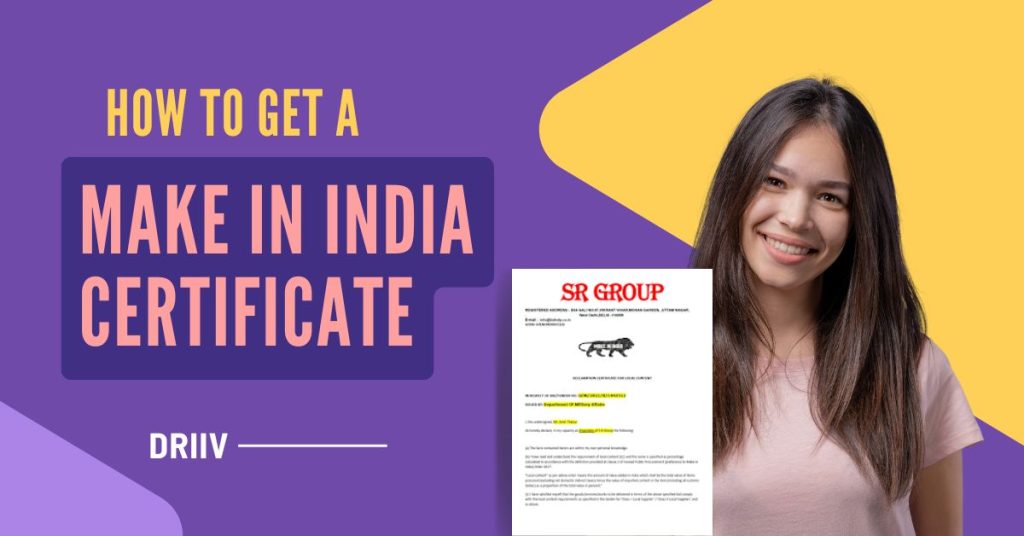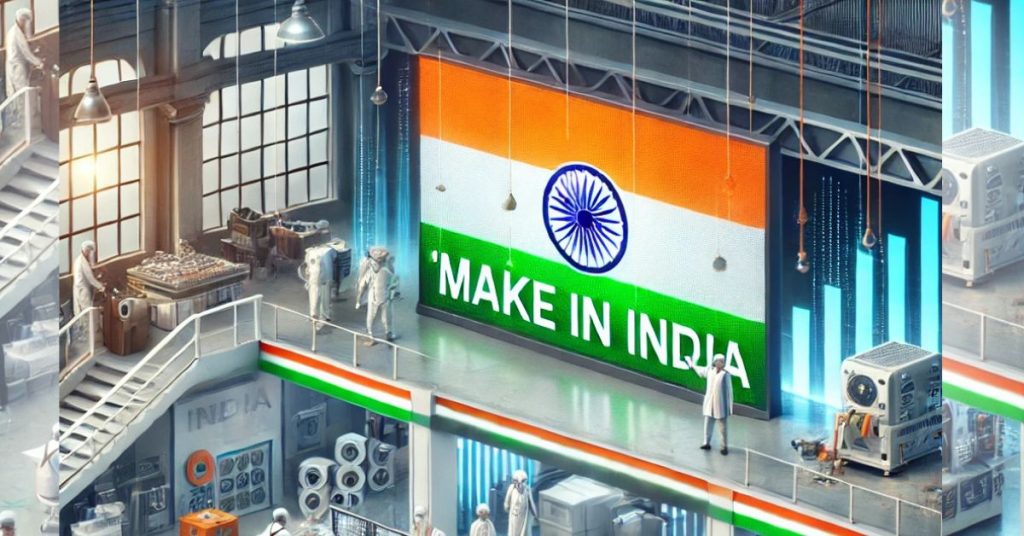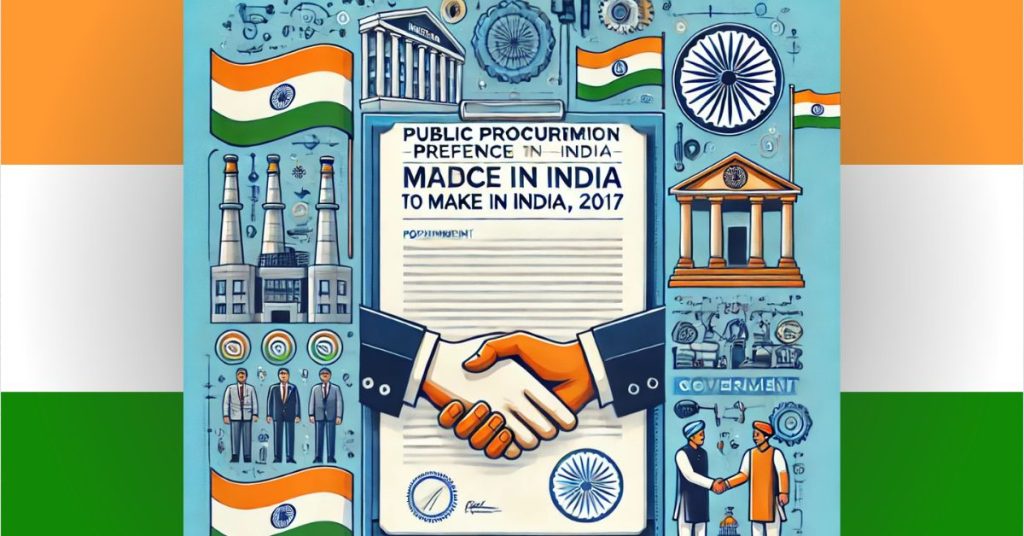The Make in India Certificate is an important document for businesses that manufacture products in India. It is issued under the Make in India initiative, launched by the Government of India to promote domestic manufacturing and reduce dependency on imports. This certificate helps businesses gain recognition, participate in government tenders, and avail benefits under various government schemes.
What is the Make in India Certificate?
The Make in India Certificate is an official document that certifies that a product is manufactured in India. It helps businesses prove that their products meet the local content requirements as per government policies. This certificate is often required for participation in government tenders and availing incentives under various government schemes.
It is important to note that there is no single authority that issues the Make in India Certificate. Instead, businesses can obtain certification through self-declaration or from government-recognized agencies that verify the percentage of Indian-made content in their products.
Who Needs the Make in India Certificate?
The Make in India Certificate is beneficial for:
- Manufacturers who produce goods in India and want to gain credibility.
- Suppliers participating in government tenders under the Public Procurement (Preference to Make in India) Order, 2017.
- Exporters looking to promote their Indian-made products in foreign markets.
- Businesses applying for government incentives and subsidies related to manufacturing.
If your business falls under these categories, obtaining this certificate can help you gain a competitive edge.
Benefits of Getting a Make in India Certificate
- Government Tenders – Many government tenders require businesses to have a Make in India Certificate to prove that their products meet local content requirements.
- Incentives and Subsidies – Businesses with this certificate may be eligible for various government incentives, tax benefits, and subsidies.
- Increased Credibility – The certificate enhances your brand’s reputation as an Indian manufacturer, attracting more customers.
- Market Preference – Government and private buyers prefer products that align with the Make in India initiative.
- Foreign Investment – Having this certification can make your business more attractive to foreign investors who want to support Indian manufacturing.
Eligibility Criteria for the Make in India Certificate
To obtain a Make in India Certificate, a company must meet certain conditions:
- The product should be manufactured in India.
- The percentage of Indian components in the product should meet the minimum local content requirement as defined under the Public Procurement Order.
- The business must be registered in India, having a valid GST and PAN.
There are different categories of local content:
- Class-I Supplier – Manufacturers with more than 50% local content in their products.
- Class-II Supplier – Manufacturers with 20% to 50% local content in their products.
Companies with less than 20% local content are not eligible for benefits under the Make in India policy.
How to Apply for the Make in India Certificate
The process of obtaining the Make in India Certificate involves the following steps:
Step 1: Self-Assessment of Local Content
Before applying, businesses should assess the percentage of local content in their products. This is calculated based on the cost of raw materials, labor, and manufacturing expenses incurred within India.
Step 2: Prepare Necessary Documents
To apply for the certificate, you need to gather the following documents:
- Company Registration Certificate (like GST, PAN, or UDYAM Registration for MSMEs)
- Manufacturing License or Factory Registration
- Details of Local Content Calculation (showing the percentage of Indian-made components)
- Declaration Form stating compliance with the Make in India requirements
- Product Details including specifications and manufacturing process
- Financial Statements or cost sheets related to production
Step 3: Submit Application to the Relevant Authority
There is no centralized government body for issuing the Make in India Certificate. However, businesses can obtain certification from:
- Self-Certification – Companies can declare their local content percentage through an official self-declaration affidavit on their letterhead. This is commonly used for government tenders.
- Third-Party Certification – Some businesses prefer certification from government-recognized testing agencies, chambers of commerce, or industry bodies like the Quality Council of India (QCI) or Bureau of Indian Standards (BIS).
Step 4: Verification and Approval
If applying through a third-party certification body, they may conduct an inspection of the manufacturing unit and verify the documents. Once approved, the certificate will be issued.
Step 5: Use the Certificate for Business Benefits
After obtaining the certificate, businesses can use it while applying for government tenders, promotional campaigns, and tax benefits.
Also Read: Make in India: A Step Towards Self-Reliant Economy
Cost of Obtaining a Make in India Certificate
There is no fixed fee for obtaining a self-declared Make in India Certificate as it is done by the business itself. However, if you opt for certification from a third-party agency, the cost may vary depending on:
- The certifying body
- The type of industry
- The number of products being certified
On average, the cost for third-party certification can range from ₹5,000 to ₹50,000, depending on the complexity of verification.
How Long Does it Take to Get the Certificate?
- Self-Declaration – Can be issued immediately by the company.
- Third-Party Certification – May take 1 to 4 weeks, depending on the verification process.
Validity of the Make in India Certificate
The validity of the certificate depends on the issuing authority:
- Self-Declared Certificates – Usually valid for one year and can be renewed annually.
- Third-Party Certificates – Validity depends on the agency but is typically one to three years.
Common Mistakes to Avoid While Applying
- Incorrect Local Content Calculation – Ensure that the percentage of local content is calculated properly to avoid rejection.
- Missing Documents – All required documents should be submitted properly to avoid delays.
- Choosing the Wrong Certification Body – If opting for third-party certification, select a government-recognized body.
- Using an Expired Certificate – Always check the validity of your certificate before submitting it for tenders.
Conclusion
The Make in India Certificate is an important document for businesses manufacturing in India. It helps in gaining government support, participating in tenders, and availing incentives. While there is no single authority issuing this certificate, businesses can either self-certify or get certification from third-party agencies.
By following the correct steps, ensuring compliance with local content requirements, and maintaining proper documentation, you can easily obtain the Make in India Certificate and take advantage of the benefits it offers.
Frequently Asked Questions
What is the Make in India Certificate?
The Make in India Certificate is a document that certifies a product is manufactured in India. It helps businesses participate in government tenders, gain recognition, and avail benefits. Companies can self-declare or get certification from recognized agencies to prove their local content percentage.
Who can apply for the Make in India Certificate?
Manufacturers, suppliers, and exporters who produce goods in India can apply. It is mainly required for businesses participating in government tenders, availing subsidies, or proving their products meet the local content requirements under the Public Procurement (Preference to Make in India) Order, 2017.
How can I get a Make in India Certificate?
You can get the certificate through self-declaration or from government-recognized agencies. The process involves calculating local content, preparing necessary documents, and submitting the application. Some agencies may conduct verification before issuing the certificate, which can take a few weeks.
What documents are needed for Make in India Certificate?
You need company registration documents (GST, PAN), a manufacturing license, details of local content percentage, product specifications, and a declaration of compliance with Make in India guidelines. If applying through a third-party agency, additional documents like financial statements may be required.
How much does the Make in India Certificate cost?
If you opt for self-declaration, there is no cost. However, if you get it from a third-party certification agency, the cost can range from ₹5,000 to ₹50,000, depending on the verification process and industry type. The certificate is usually valid for one to three years.




